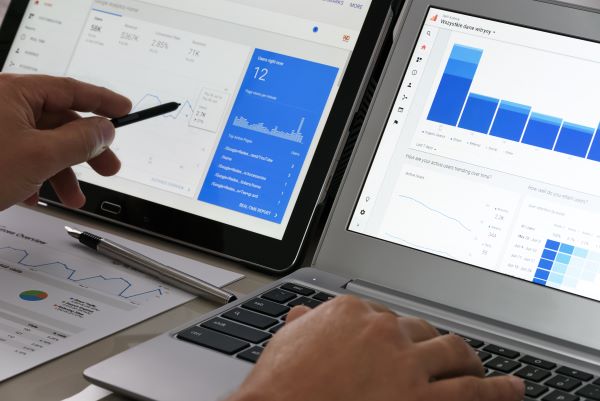Paid Search Management: How Do Paid Campaigns Benefit Your Business?
In the world of e-marketing, paid search is a powerful strategy that allows businesses to advertise their products or services on search engines like Google, Bing, and Yahoo.
Paid Search – What Does It Mean?
Paid search, also known as pay-per-click (PPC) advertising, can be a game-changer for your business. But before diving into its benefits, let’s explore what paid search really means.
Understanding Paid Search
Paid search involves the placement of ads on search engine results pages (SERPs). When users enter relevant keywords into a search engine, these ads appear prominently, often above or beside organic search results. The key differentiator is that advertisers only pay when a user clicks on their ad, making it a cost-effective and measurable marketing channel.
Why Paid Search Matters
- Ad targeting: Businesses can customize their paid search ads to target specific keywords and demographics.
- Immediate Results: Unlike some marketing strategies that take time to gain traction, paid search delivers results almost instantly.
- Measurable ROI: The pay-per-click model makes it easy to track and measure the return on investment (ROI) of your campaigns.
- Budget Control: You have full control over your advertising budget, which means you can scale up or down based on your business needs.
How to Set Up a PPC Campaign

Now that you understand the concept of paid search, let’s dive into the process of setting up a paid search management campaigns step by step.
Define Your Goals
Before you start creating your PPC campaign, you need to establish clear goals. How do you plan to achieve your advertising goals? Common goals include increasing website traffic, generating leads, driving sales, or building brand awareness.
Keyword Research
Keyword research is a fundamental step in PPC campaign setup. You need to identify the keywords that are most relevant to your business and target audience. Tools like Google Keyword Planner can help you find the right keywords to target.
Subtitles for Keyword Research
- Selecting High-Value Keywords: Focus on keywords with high search volumes and relevance to your products or services.
- Long-Tail Keywords: Consider using long-tail keywords to capture specific, highly motivated searchers.
- Competitor Analysis: Analyze what keywords your competitors are targeting to gain insights.
Campaign Structure
Organize your PPC campaign into well-structured ad groups. Each ad group should target a specific set of related keywords. This ensures that your ads are highly relevant to what users are searching for.
- Ad Group Setup: Create separate ad groups for different product categories or services.
- Ad Copywriting: Craft compelling ad copy that aligns with each ad group’s keywords.
- Landing Pages: Design landing pages that match the ad’s message and keywords for a better user experience.
Bidding and Budgeting
Determine your budget and bidding strategy. You can set daily or monthly budget limits and choose between automatic or manual bidding. Bidding is a critical aspect of PPC campaign management, as it directly impacts the visibility of your ads.
- Bid Strategy: Decide whether to use manual bidding or automated bidding strategies.
- Budget Allocation: Set your budget limits and allocate funds to different ad groups strategically.
- Quality Score: Focus on improving your ad’s quality score, which affects your ad rank and costs.
Ad Extensions
Ad extensions provide additional information to your ads, making them more attractive and informative. Utilize various ad extensions like site link extensions, callout extensions, and structured snippet extensions to enhance your ad’s visibility and relevance.
- Choosing the Right Extensions: Select ad extensions that are most relevant to your business and goals.
- Creating Compelling Ad Extensions: Craft ad extensions that encourage users to take action.
- Regular Monitoring: Continuously monitor the performance of your ad extensions and make adjustments as needed.
What Is the Ranking Process for Search Engines’ Ads?
In paid search, your ads’ position on the search engine results page is determined by an auction-based system and a combination of factors. Understanding how ads are ranked can help you optimize your campaigns for better results.
Ad Rank Formula
The ad rank is a crucial component in determining the position of your ad. It can be calculated as follows:
Ad Rank = Bid Amount x Quality Score
- Bid price: This is the highest price you are willing to pay for a click on your ad.
- Quality Score: Quality Score is a measure of the relevance and quality of your ad, landing page, and keywords.
Ad Position
The ad position is where your ad appears on the SERP. The top positions are generally more expensive but also receive more visibility.
Subtitles for Ad Position
- Top vs. Side Position: Understand the differences between ads appearing at the top and on the side.
- Impression Share: Track your ad’s impression share to see how often it’s appearing in the top positions.
- Competitor Bidding: Monitor and adjust your bids to compete effectively with other advertisers.
Click-Through Rate (CTR)
Click-through rate refers to the percentage of users who click on your ad after seeing it. A higher CTR indicates that your ad is more relevant to users, and search engines reward this with a better ad rank.
Subtitles for CTR
- Ad Relevance: Make sure your ad copy is relevant to the user’s query.
- A/B Testing: Continuously test ad variations to improve CTR.
- Negative Keywords: Exclude irrelevant keywords to improve CTR and ad relevance.
Quality Score Factors
Google, for example, considers several factors when determining the Quality Score of your ads. These factors include ad relevance, landing page experience, and expected click-through rate.
Subtitles for Quality Score Factors
- Ad Relevance: Ensure your ad copy aligns with the user’s search intent.
- Landing Page Experience: Optimize your landing page for the best user experience.
- Expected Click-Through Rate: Create compelling ads to increase the likelihood of clicks.
In conclusion, paid search management can greatly benefit your business by driving targeted traffic, providing immediate results, and offering measurable ROI. Setting up a successful PPC campaign involves defining goals, thorough keyword research, well-structured ad groups, effective bidding and budgeting, and strategic use of ad extensions.
Understanding the ranking process for search engine ads, including the ad rank formula, ad position, CTR, and Quality Score factors, is essential for optimizing your campaigns and achieving a competitive edge in the digital advertising landscape.





